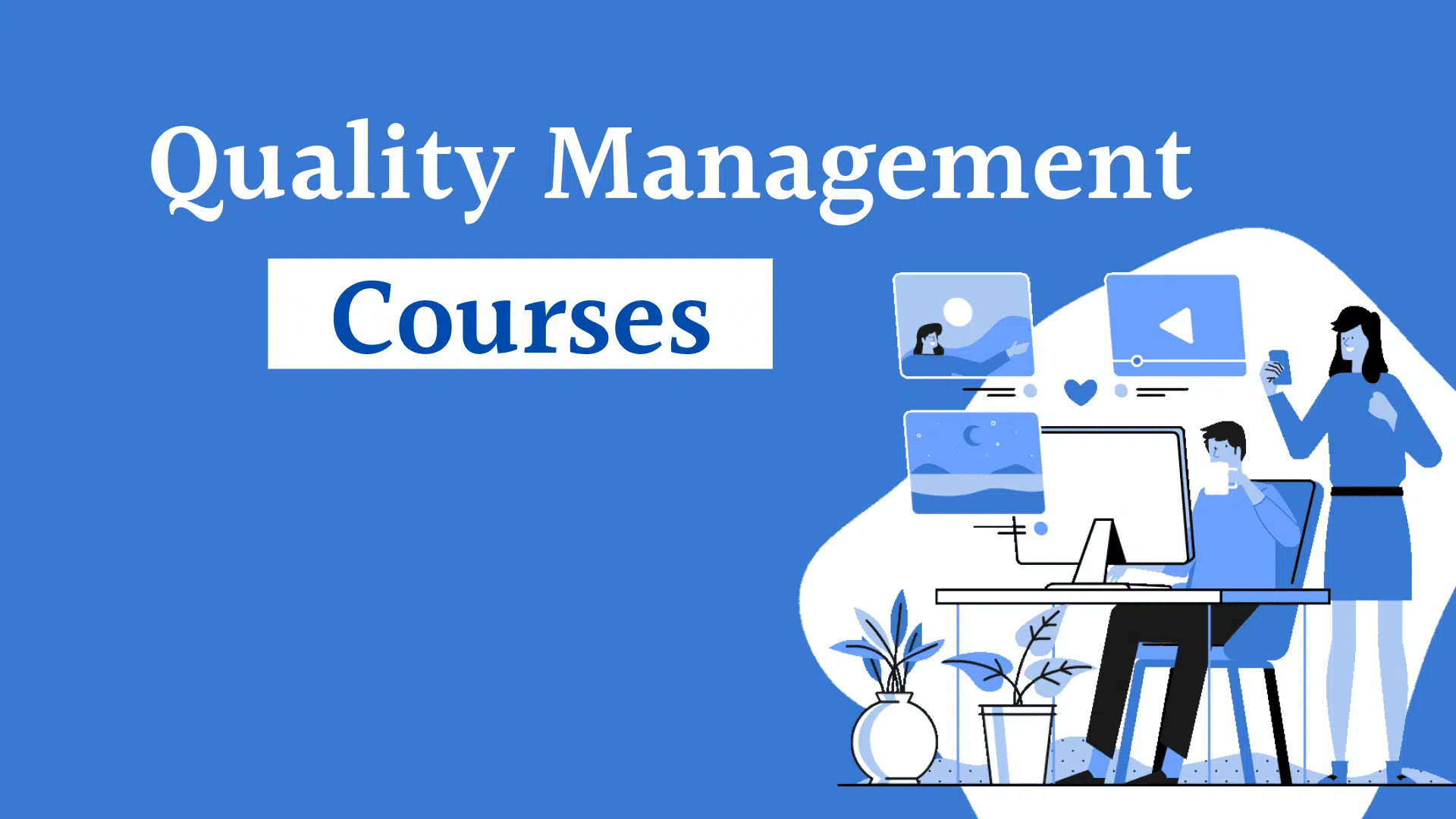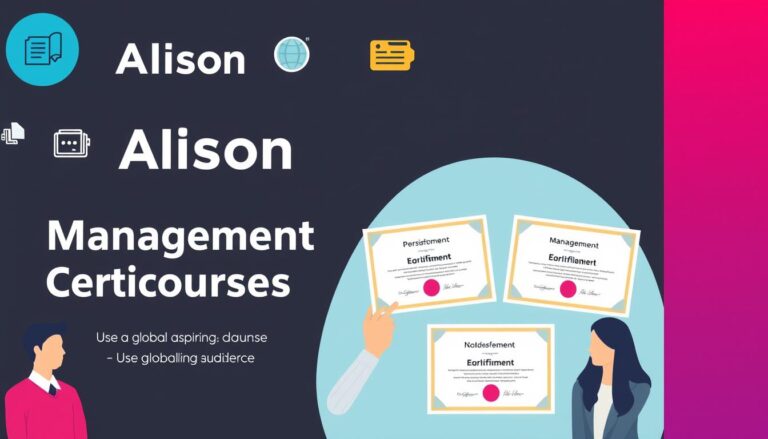Comprehensive Quality Management Courses to Upskill
In today’s fast-paced business environment, staying ahead of the curve requires more than just technical skills; it demands a deep understanding of quality management principles that drive operational excellence and customer satisfaction.

As professionals, we’re constantly looking for ways to upskill and remain relevant in our respective fields. Investing in quality management education can significantly enhance our capabilities and career prospects.
With the increasing importance of quality and management across industries, from manufacturing and healthcare to technology and service sectors, acquiring the right skills and knowledge is crucial for success.
Key Takeaways
- Understanding the importance of quality management in today’s competitive business landscape.
- Exploring how quality management education can enhance professional capabilities.
- Identifying effective quality management courses for career advancement.
- Analyzing different learning approaches and certification pathways.
- Recognizing the impact of quality management on business outcomes and career growth.
The Value of Quality Management Training in Today’s Business Landscape
The modern business landscape underscores the value of quality management training for professionals and organizations alike. As we navigate through an era of heightened competition and evolving customer expectations, the significance of quality management has never been more pronounced.
Quality management training provides a systematic approach to improving organizational performance. It equips professionals with the skills necessary to identify, analyze, and eliminate defects in products and services, thereby enhancing overall quality.
Why Quality Management Skills Are Essential for Professionals
Modern quality management skills extend far beyond traditional quality control, encompassing strategic business thinking and continuous improvement methodologies. Professionals equipped with these skills are better positioned to drive transformation initiatives and process optimization within their organizations. As noted by a quality management expert, “Quality management is not just about maintaining standards; it’s about creating a culture of excellence that permeates every level of the organization.”
- Quality management training fosters a culture of continuous improvement.
- It equips professionals with data-driven decision-making capabilities.
- Organizations with strong quality management cultures outperform their competitors.
How Quality Management Training Impacts Business Performance
The impact of quality management training on business performance is multifaceted. It leads to reduced waste, improved customer retention, and enhanced operational efficiency. By integrating quality management principles across business functions, organizations can create a resilient and adaptable business model. As we continue to navigate the complexities of the modern business landscape, investing in quality management training is not just beneficial – it’s essential for long-term success.
By emphasizing quality and management skills, businesses can drive growth and stay competitive. The return on investment for such training is evident in improved bottom-line results and a stronger market position.
Understanding Different Types of Quality Management Certifications
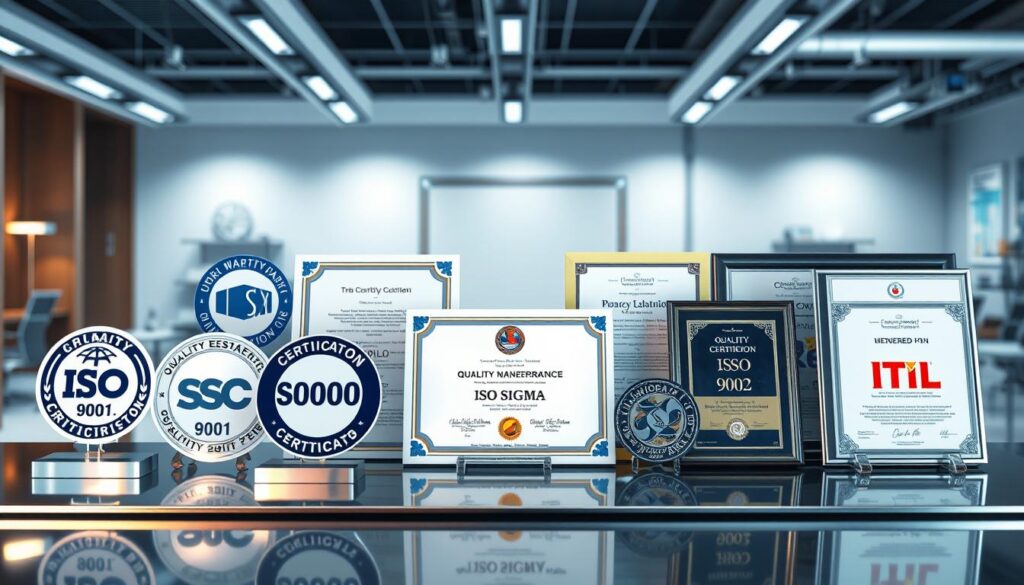
As we navigate the complex landscape of quality management, understanding the various certification options becomes crucial for professionals seeking to enhance their skills. The diverse range of certifications available can be overwhelming, but each serves a specific purpose in ensuring quality practices across different industries.
ISO-Based Quality Management Certifications
ISO-based certifications establish internationally recognized standards for quality management systems, facilitating global business operations. These certifications provide a framework for organizations to implement consistent quality practices, ensuring they meet international standards. By obtaining ISO-based certifications, companies demonstrate their commitment to quality management and enhance their credibility in the global market.
Six Sigma and Lean Methodologies
Six Sigma methodologies offer data-driven approaches to process improvement, with belt-level certifications (Yellow, Green, Black) indicating progressive expertise. Six Sigma focuses on reducing defects and variations in business processes, while Lean methodologies aim to eliminate waste and maximize efficiency. The combination of Six Sigma and Lean principles provides a comprehensive quality management solution, enabling organizations to achieve operational excellence.
Industry-Specific Quality Management Credentials
Industry-specific quality management credentials address unique regulatory requirements and best practices in sectors like healthcare, pharmaceuticals, and manufacturing. These specialized certifications ensure that professionals have the necessary knowledge and skills to manage quality in their respective industries. By obtaining industry-specific credentials, professionals can demonstrate their expertise and commitment to quality management in their field.
In conclusion, the right certification path depends on your industry context, career goals, and the specific quality challenges your organization faces. By understanding the different types of quality management certifications available, professionals can make informed decisions about their career development and organizations can enhance their quality management practices.
Key Skills Developed Through Best Quality Management Courses
Best quality management courses focus on building a comprehensive set of skills for quality professionals. These courses are designed to enhance both technical and soft skills necessary for implementing robust quality systems.
Technical Quality Control Competencies
Technical quality control competencies are a crucial aspect of quality management. These include statistical analysis, measurement system analysis, and process capability studies. By mastering these technical skills, quality professionals can effectively monitor and control production processes, ensuring high-quality outputs.
Quality Assurance Process Management
Quality assurance process management skills focus on designing systems that prevent defects rather than merely detecting them. This proactive approach involves process mapping and optimization techniques to create efficient quality assurance processes. Effective quality assurance professionals must also develop communication skills to translate technical quality data into actionable business insights.
Risk Assessment and Mitigation Strategies
Risk assessment methodologies taught in quality management courses help professionals identify potential failure points before they impact products or services. Advanced quality management training develops skills in root cause analysis and corrective action implementation. By integrating quality control, quality assurance, and risk management, organizations can adopt a holistic approach to excellence.
By developing these key skills, quality management professionals can drive organizational excellence and maintain high standards in their respective industries.
Online vs. In-Person Quality Management Training: Pros and Cons

The delivery format of quality management training can greatly affect the learning experience and its application in real-world scenarios. As professionals in the field of quality management, it’s essential to weigh the advantages and disadvantages of online and in-person training to make an informed decision.
Benefits of Virtual Learning Environments
Online quality management courses offer numerous benefits, including flexibility, accessibility, and often more affordable options for professionals balancing work responsibilities. Virtual learning environments frequently provide interactive simulations and real-time feedback that enhance the quality management learning experience. Some key advantages include:
- Flexibility to learn at one’s own pace
- Access to a wide range of resources and materials
- Cost-effectiveness compared to traditional classroom training
When Traditional Classroom Training Makes More Sense
While online training has its advantages, traditional classroom training excels in facilitating hands-on exercises and collaborative problem-solving essential for certain quality management techniques. In-person training also creates valuable networking opportunities with peers and instructors. Key benefits include:
- Hands-on experience with practical applications
- Direct interaction with instructors and peers
- Opportunities for immediate feedback and clarification
Ultimately, the choice between online and in-person quality management courses depends on individual learning preferences, career goals, and available resources. By understanding the pros and cons of each format, professionals can make informed decisions to enhance their management skills.
Best Quality Management Courses on Coursera
With numerous options available, Coursera stands out as a premier platform for quality management education. Coursera partners with leading universities and organizations to deliver high-quality, accessible quality management education.

Quality Improvement and Management by Board Infinity
The Quality Improvement and Management course by Board Infinity provides comprehensive coverage of quality methodologies applicable across industries. This course is designed to equip professionals with the skills needed to improve quality management processes.
Leading Healthcare Quality and Safety by George Washington University
Leading Healthcare Quality and Safety by George Washington University addresses the unique quality challenges in healthcare settings, including patient safety protocols and regulatory compliance. This program is ideal for healthcare professionals seeking to enhance their knowledge of quality management.
Engineering Project Management: Risk, Quality, Teams, and Procurement by Rice University
Engineering Project Management by Rice University integrates quality management principles with project execution frameworks, emphasizing risk management and team coordination. This course is beneficial for professionals involved in engineering projects.
Google Project Management Certificate
The Google Project Management Certificate offers a practical approach to quality management within project contexts, incorporating real-world case studies from Google’s operations. This certificate program is designed to provide hands-on experience in project management.
An image representing Google Project Management Certificate Learn MoreCoursera’s quality management courses typically feature flexible scheduling, peer interaction opportunities, and graded assignments that reinforce learning. These courses often provide shareable certificates that can enhance professional credibility and demonstrate commitment to quality excellence.
Top Quality Management Training from AAMI

AAMI offers specialized quality management training programs developed in consultation with healthcare regulators and industry experts. Their online training specializes in areas related directly to medical devices and technologies.
Medical Device Quality Management Programs
AAMI’s medical device quality management programs address the unique regulatory requirements and risk management considerations specific to medical technology. These programs help professionals implement compliant quality systems in healthcare settings.
- Address unique regulatory requirements
- Focus on risk management considerations
- Implement compliant quality systems
Specialized Healthcare Quality Assurance Webinars
The specialized healthcare quality assurance webinars cover emerging topics like AGILE practices in medical device software development and novel sterilization processes. These webinars are valuable for professionals working in regulated healthcare environments.
- Cover emerging topics in healthcare quality assurance
- Include AGILE practices and novel sterilization processes
- Beneficial for professionals in regulated environments
By combining theoretical foundations with practical applications, AAMI’s training programs help quality professionals navigate the complex intersection of quality management, regulatory compliance, and technological innovation in healthcare.
ISO 13485 Store’s Quality Management Education Options
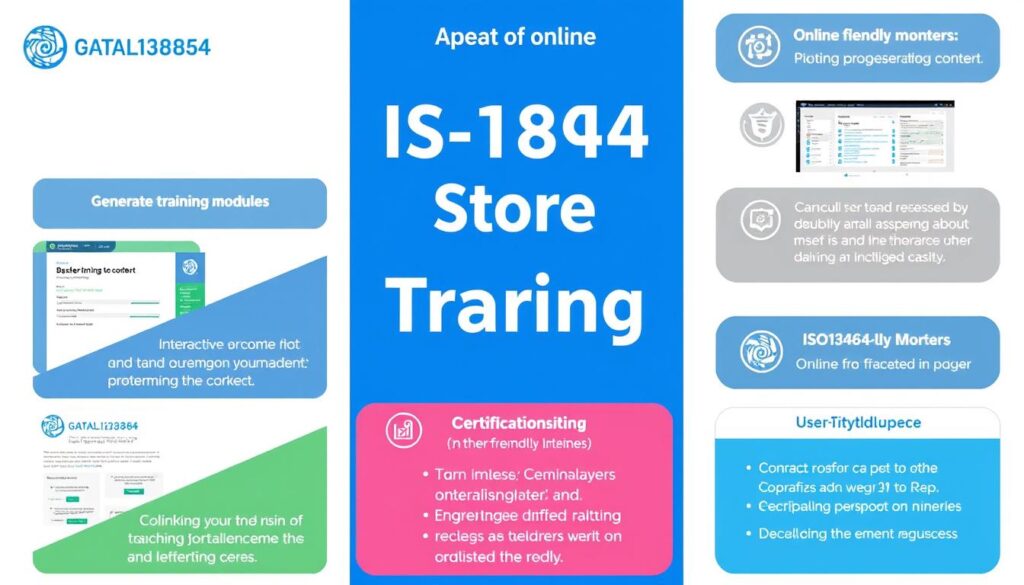
With a robust selection of online training options, the ISO13485 Store is revolutionizing quality management education. The ISO13485 Store specializes in training focused on the international standard for medical device quality management systems.
Their regulatory compliance training addresses the complex and evolving requirements governing medical device quality management across global markets. This includes topics such as the regulatory implications of Brexit and understanding changes to EN-60601.
Regulatory Compliance Training
The ISO13485 Store’s regulatory compliance training is designed to help professionals navigate the intricate landscape of medical device regulations. Their courses cover critical areas such as:
- Validation and Verification: Clarifying the distinct requirementsfor these critical quality management system processes.
- Unannounced Audits: Preparing quality management professionals for the increasing regulatory focus on real-time compliance verification.
Technical Documentation and Validation Courses
Their technical documentation courses help quality professionals develop and maintain the extensive documentation required by ISO13485 and related regulations. Additionally, validation and verification training ensures that professionals are well-versed in the quality management system processes.
The ISO13485 Store offers flexible learning formats, including online courses, webinars, and virtual training, to accommodate different learning preferences. Their courses are particularly valuable for organizations needing to align their quality management system with international standards.
ISPE’s Pharmaceutical Quality Management Programs
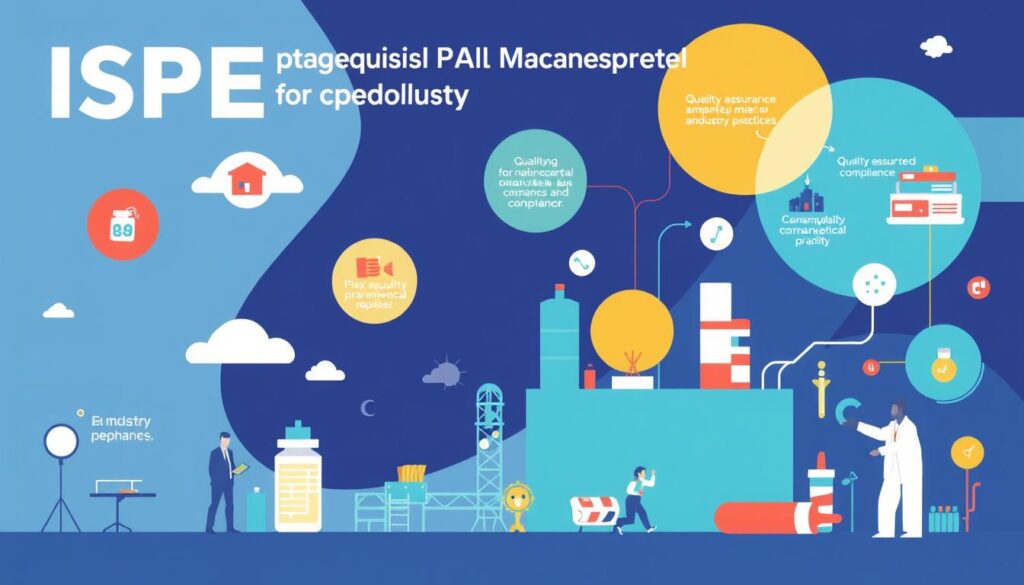
For professionals in the pharmaceutical industry, ISPE’s quality management programs are designed to enhance process improvement and quality assurance. ISPE offers a wide array of training options, including Recorded Sessions, Expanded Online Training, and Online Learning Webinars, catering to the diverse needs of pharmaceutical professionals.
GMP and Compliance-Focused Training
ISPE’s GMP and compliance-focused training addresses the stringent regulatory expectations for pharmaceutical manufacturing quality management. Their programs cover critical topics such as Product Quality Lifecycle Implementation (PQLI®) and GAMP Interpretation – Annex11, ensuring that professionals are well-versed in the latest regulatory requirements and industry best practices.
Process Analytical Technology Courses
ISPE’s Process Analytical Technology courses are designed to help quality professionals implement real-time quality monitoring and control systems, enhancing process improvement and quality assurance. These courses focus on the practical application of PAT tools and techniques, enabling professionals to optimize their manufacturing processes and improve product quality.
ISPE’s training programs emphasize data-driven approaches to process improvement and quality metrics that demonstrate control and capability. By incorporating industry case studies and real-world examples, ISPE’s courses provide professionals with the knowledge and skills necessary to navigate the complex landscape of pharmaceutical quality management.
Udemy’s Flexible Quality Management Learning Paths

With Udemy, individuals can access a broad spectrum of quality management courses tailored to their career goals. Udemy offers a marketplace approach to quality management education, allowing professionals to select specific courses that address their unique learning needs.
Udemy’s quality management courses are designed to be flexible and comprehensive, covering a range of topics from foundational principles to specialized skills. Their courses often include practical tools, templates, and methodologies that can be immediately applied in workplace quality management contexts.
ISO9001:2015 Quality Management System Auditor Courses
Udemy’s ISO9001:2015 Quality Management System Auditor Courses prepare professionals to evaluate and improve quality management systems against international standards. These courses are crucial for professionals aiming to ensure compliance and enhance organizational performance.
Quality Management for Business Excellence Programs
Quality Management for Business Excellence Programs on Udemy connect quality principles with broader organizational performance and competitive advantage. These programs help professionals understand how to drive business excellence through effective quality management practices.
Certified Quality Engineer Training Options
Udemy’s Certified Quality Engineer training options help professionals prepare for ASQ certification exams while building practical quality engineering skills. This training is essential for those looking to advance their careers in quality engineering.
Udemy’s flexible approach allows quality professionals to build customized learning paths that align with their industry context and career goals. The platform’s rating and review system helps quality professionals identify the most effective courses based on peer feedback and demonstrated results.
PDA’s Specialized Quality Management Training

With a strong industry presence, PDA delivers quality management training tailored to the pharmaceutical sector. Their programs are designed to address the complex challenges faced by professionals in sterile pharmaceutical manufacturing.
PDA’s training initiatives are geared towards enhancing quality assurance and process improvement in the pharmaceutical industry. By focusing on critical areas such as sterile manufacturing and regulatory compliance, PDA helps professionals develop the skills needed to ensure high-quality products and processes.
Root Cause Investigation and CAPA Training
PDA’s Root Cause Investigation and CAPA Training equips professionals with the skills to identify and address the underlying causes of quality issues. This training is crucial for quality management and process improvement, enabling organizations to implement effective corrective and preventive actions.
Sterile Manufacturing and Regulatory Compliance Courses
PDA’s sterile manufacturing courses address the unique quality assurance challenges in aseptic processing environments. By leveraging PDA’s strong relationships with global regulatory bodies, these courses provide insights into evolving quality expectations and regulatory compliance requirements, ensuring that professionals are well-versed in quality management and process optimization.
Free and Affordable Quality Management Courses from Alison

Quality management professionals can now access high-quality, free courses on Alison, making professional development more accessible. Alison prides itself on being a socially conscious free learning platform that seeks to be a catalyst for positive change and prosperity for everyone.
Alison offers a range of courses that cater to different aspects of quality management. These include ISO13485:2016 – Quality Management Systems for Medical Devices and Fundamentals of Quality Standards – Revised 2018. Such courses provide foundational knowledge of international quality standards that form the basis of effective management systems.
ISO Standards and Quality Management Fundamentals
Alison’s ISO Standards courses introduce learners to core concepts such as process approach, risk-based thinking, and continuous improvement that underpin all quality systems. Their courses frequently include practical examples and case studies that illustrate the application of quality standards across diverse organizational contexts.
Quality Management Diploma Programs
For those seeking more comprehensive education, Alison’s Quality Management Diploma Programs offer structured learning formats that cover quality principles, tools, and methodologies in depth. While the courses are free, Alison offers affordable certification options that provide formal recognition of completed quality management education.
By leveraging Alison’s free and affordable quality management courses, professionals can enhance their skills in quality management, improve their understanding of quality standards, and develop competencies in managing quality systems effectively.
AAPS’s Comprehensive Pharmaceutical Quality Assurance Programs
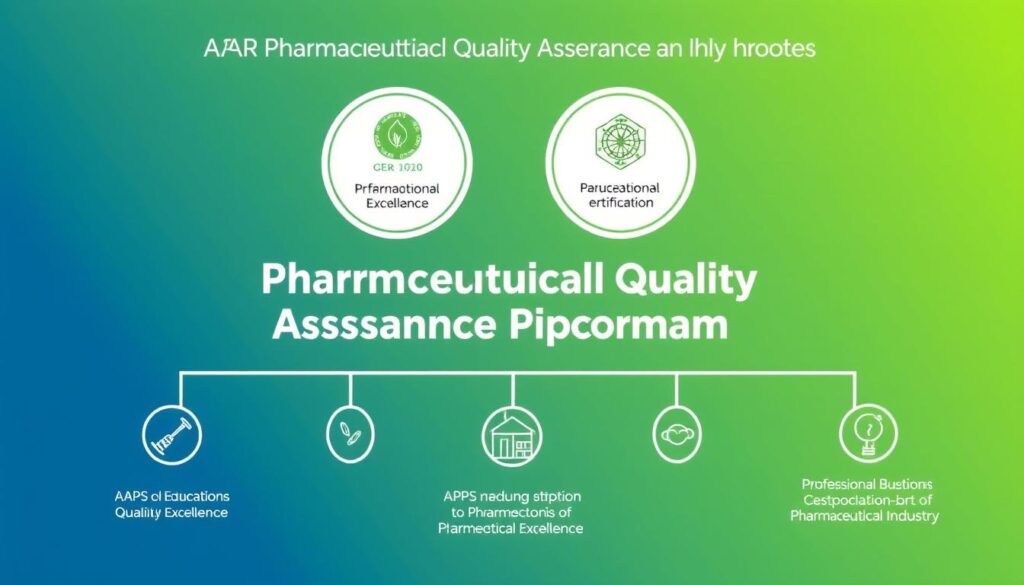
AAPS’s online Pharmaceutical Quality Assurance and Quality Control Diploma Program is designed to equip students with in-depth knowledge and skills in quality assurance and quality control. This comprehensive program is taken in three phases over 12 months and includes courses on Good Manufacturing Practices, Pharma Lab Testing, Workplace Hazardous Material Information Systems (WHMIS), Dissolution Testing, and Regulatory Affairs.
Pharmaceutical Analysis and Regulatory Affairs Training
AAPS’s Pharmaceutical Analysis training develops technical skills in testing methodologies that ensure product quality throughout the manufacturing lifecycle. Their Regulatory Affairs courses help quality professionals navigate complex regulatory requirements governing pharmaceutical product approval and ongoing compliance.
GMP and Laboratory Testing Courses
AAPS’s GMP courses address the practical implementation of Good Manufacturing Practices that form the foundation of pharmaceutical quality management. Their Laboratory Testing programs develop hands-on skills in analytical techniques used to verify pharmaceutical product quality and consistency.
By integrating quality assurance theory with practical laboratory skills and regulatory knowledge, AAPS creates well-rounded quality professionals. Their structured diploma program provides a systematic pathway to develop comprehensive pharmaceutical quality assurance competencies over a 12-month period.
How to Choose the Right Quality Management Course for Your Career Goals
As we navigate the complex landscape of quality management education, selecting a course that fits our career aspirations is vital. With numerous options available, it’s essential to make an informed decision that aligns with our career goals and current knowledge level.
Assessing Your Current Skill Level and Knowledge Gaps
Begin by evaluating your current quality management skills and identifying areas that require improvement. This self-assessment will help you determine the type of course that suits your needs. Consider your knowledge gaps in areas such as technical quality control, quality assurance process management, and risk assessment.
Matching Courses to Industry Requirements
Different industries value various quality management methodologies and certifications. Research the specific requirements of your target industry or desired career path. For instance, if you’re in the medical device industry, you may need to focus on ISO 13485 or FDA regulations. Ensure that the course you choose is relevant to your industry and provides the necessary knowledge and skills.
Evaluating Course Credibility and Recognition
When selecting a quality management course, it’s crucial to evaluate the credibility of the course provider. Look for institutions with industry recognition, qualified instructors, and a track record of successful students. Check if the course offers certification or formal recognition upon completion, which can enhance your career prospects.
By carefully considering these factors, we can make an informed decision when choosing a quality management course that supports our career goals and enhances our knowledge and skills in the field.
Conclusion: Investing in Quality Management Education for Professional Growth
In the pursuit of excellence, quality management education stands out as a critical factor that can significantly impact both personal career trajectories and organizational success. Quality management education represents a strategic investment in both personal career development and organizational capability, underscoring its dual value.
The principles of continuous improvement that underpin quality management apply equally to professional development—constantly expanding knowledge and refining skills. This parallel is not coincidental; it reflects the intrinsic value of quality management training in fostering a mindset geared towards ongoing enhancement.
By acquiring quality management training, professionals gain transferable skills that remain valuable across industries, organizations, and career stages. The evolving nature of quality management means that ongoing education is essential to stay current with emerging methodologies and best practices.
As quality becomes increasingly integrated with other business disciplines, quality management education provides a foundation for cross-functional leadership. We encourage you to view quality management education not as a destination but as an ongoing journey of professional growth and continuous improvement.
By embracing this journey, professionals can become organizational change agents, driving improvement beyond traditional quality boundaries. The return on investment for quality management education manifests in career advancement opportunities, increased earning potential, and greater professional impact.

